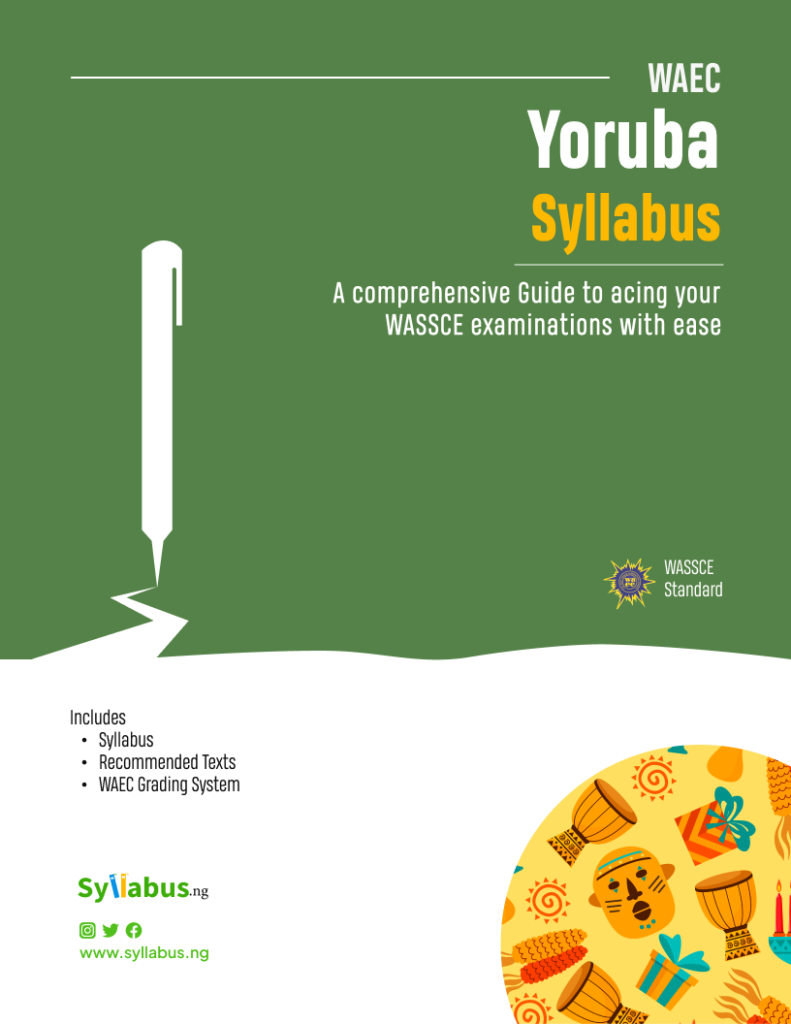Ace your WAEC Yoruba exam with ease! Download our comprehensive syllabus today and start your journey to success.

Home » WAEC Syllabus » WAEC Yoruba Syllabus
This syllabus is your number 1 guide if you will be writing Yoruba in the upcoming WAEC examinations and you want to be one step ahead of your peers.
To perform well, you should be able to speak, read and write Yoruba to a certain level. Familiarize yourself with the Yoruba sound system, grammatical structures and other features of the Yoruba language like common cultural and traditional practices.
This is why you have this syllabus to provide you with the necessary information needed to do well in your examinations. This and your past questions booklet is a must have for all intending candidates.
The examination will consist of two papers, Papers 1 and 2. It will test the following aspects of Yoruba Language: comprehension, composition, sound system, grammar and translation. It will also test selected texts of oral and written literature as well as Basic Principles of Literary Appreciation, Customs and Institutions. The rubrics shall be written in Yoruba.
PAPER 1 shall contain 60 multiple-choice objective questions on Language, Literature and Culture. The paper shall have three sections, Section A, B and C.
Candidates will be required to answer all the questions in 1 hour for 60 marks. The questions shall be distributed as follows:
Section A: LANGUAGE
Section B: LITERATURE
Section C: CULTURE

Excelling your WAEC Yoruba exam starts from knowing what’s expected of you.
Don’t be left behind. Download the Syllabus today.
| WAEC Yoruba Syllabus | ||
| SN | TOPICS | OBJECTIVES |
| A | LANGUAGE | Composition Candidates are advised to write 300 words and spend not more than 45 minutes on this section. The essay will be any of the following types: (i) Narrative (ii) Descriptive (iii) Argumentative (iv) Expository (v) Dialogue (vi) Debate (vii) Letter writing Sound System Candidates will be required to answer one question from the two to be set. Areas to cover include: (i) Vowels, Consonants and Syllabic nasal (a) their production in terms of place and manner (b) their basic phonetic and phonemic classification (ii) Syllable structure (iii) Sound processes, e.g. vowel harmony assimilation elision (iv) Sound system aspect of the orthography (v) Tones and tone notation Grammar Candidates will be required to answer one question from the two questions to be made available. Areas to cover are: i. Word structure and word formation ii. Numerals: basic and derived iii. Word classes: nouns, verbs, adverbs, pronouns, adjectives, etc iv. Grammatical categories: subject, object, complement, predicate, number, person, tense, aspect, mood, etc. v. Phrases and clauses vi.The structure and type of sentences. |
| B | LITERATURE | This section is made up of Oral Literature and Written Literature. Oral Literature – Prose, Poetry, Drama In Oral Literature, there will be 3 set books covering the different genres. 1 question will be set from each set book and candidates will be required to answer any 1 of the 3 questions. Written Literature – Prose, Poetry, Drama In Written Literature, there will be three set books covering the different genres. One question will be set from each set book and candidates will be required to answer any one of the three questions. |
| C | CULTURE | This section will consist of questions on customs and institutions. Two questions will be set and candidates will be required to answer any one of them. Areas to cover will include: Customs (i) Make-up and adornments (ii) In-door and out-door games (iii) Pregnancy and its care (iv) Naming (v) Home training: greetings, respect for superiors, cleanliness, tolerance, integrity, hard work, etc. (vi) Yoruba foods (vii) Non-verbal communication (viii) Funerals: traditional and modern methods (ix) Inheritance: traditional and modern methods. Institutions (i) Traditional occupations (ii) Marriage (iii) Politics: family structure, age grades, chieftaincy, Obaship, etc. (iv) Child care (v) Ancestors (vi) Yoruba beliefs about Olodumare (God), deities/divinities, other invisible forces, etc. (vii) Modern religions: Islam, Christianity, etc. (viii) Economy: adverts, money lending, cooperative efforts, etc. |
ORAL LITERATURE
PROSE
POETRY
DRAMA
WRITTEN LITERATURE
PROSE
POETRY
DRAMA

Excelling your WAEC Yoruba exam starts from knowing what’s expected of you.
Don’t be left behind. Download the Syllabus today.